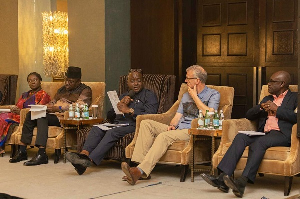The Institute of Statistical, Social and Economic Research (ISSER) of the University of Ghana in partnership with the Kiel Institute for World Economy (IfW) in Germany has hosted a National Policy Forum on Economic Zones in Accra.
The forum which was funded by Riksbankens Jubileumsfond and the Volkswagen Foundation, was on the theme, “”Special Economic Zones: A Force for Industrialization”?
Mr Michael Oquaye Junior, Chief Executive Officer (CEO), Ghana Free Zones Authority (GFZA), indicated that Special Economic Zones (SEZs) were pivots of economic success, particularly in light of the African Continental Free Trade Area (AfCFTA) implementation.
He said since its establishment in 1995, the GFZA had championed export-led industrialization, now turning towards a comprehensive adoption of SEZ policies to harness their manifold advantages.
“SEZs play a pivotal role in Ghana’s economic trajectory and therefore stakeholders must harness their potential to propel industrialization and foster sustainable development.
“SEZs across Ghana encompass over 7,000 acres of land, including zones like the Tema Export Processing Zone, Sekondi Industrial Park, Ashanti Technology Park, Yabiw/Shama Land Bank, and Afienya Special Economic Zone. These zones are poised to facilitate various industrial activities and technological innovations, driving economic diversification,” he added.
According to him, SEZs were already having a good impact on industrialisation and job creation, adding that, “in 2020, enterprises in Ghana’s free zones directly employed about 29,567 people. This number has risen to 35,399 by 2023, a remarkable 19.7 per cent increase, illustrating the zones’ significant contribution to employment.”
Mr. Oquaye added that SEZ companies generated nearly 500,000 indirect jobs while capital investments in the zones increased from US$114.62 million in 2020 to US$143million in 2023 despite temporary setbacks post-COVID
“Export revenues from SEZs also grew from US$1.5billion to US$1.7billion over the same period,” he added.
To further drive SEZ growth and local integration, Mr Oquaye noted that his outfit was promoting Ghanaian firms’ participation with 36 per cent of 258 licenced SEZ companies, fostering a diverse industrial ecosystem comprising wholly Ghanaian-owned, wholly foreign-owned, and mixed-share ownership entities.
He emphasised that the Authority had witnessed a surge in applications by companies in the service sector, employing digitalisation to export services and earn foreign exchange.
“Ghana has over 7,000 acres designated as SEZs, including the Tema Export Processing Zone and new sites like Adhenia. However, with Tema at full capacity, government is pushing Adhenia as its new industrial anchor,” he said.
Dr. Ayim-Darke, President-Association of Ghana Industries (AGI), reiterated the need for capitalising on SEZ opportunities, especially with the Continental Free Trade Area, creating an integrated African market saying, “we are at the crossroads of this era. One wonders how Africa will benefit if we do not take this opportunity seriously.”
He added that “Special economic zones epitomise the convergence of strategic planning, policy initiatives, entrepreneurial spirit and more. They offer a haven where businesses can thrive, unbound by constraints of conventional regulations.”
Business News of Sunday, 16 June 2024
Source: GNA

















